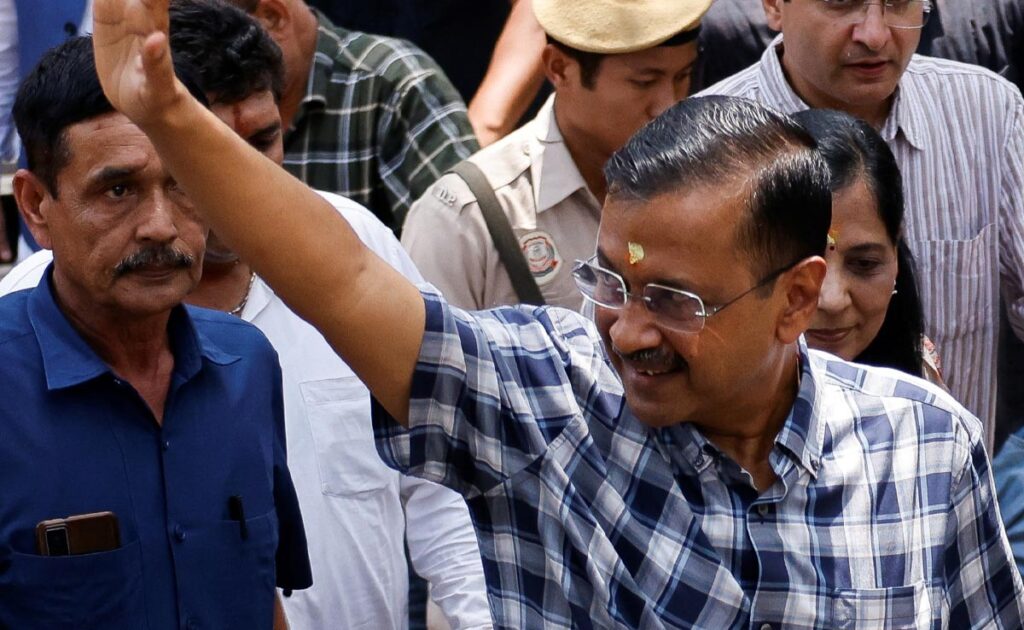Today’s Current Affairs: Supreme Court Upholds Arvind Kejriwal’s Bail Amid Criticism
The Supreme Court reiterated that Delhi Chief Minister Arvind Kejriwal’s interim bail is not an exception, despite government criticism. The court’s decision, seen as a boost for the Aam Aadmi Party during elections, emphasized the importance of democracy and the rule of law. Stay informed with the latest updates on this developing story.
1. What was the reason given by the Supreme Court for granting interim bail to Arvind Kejriwal?
– A. He is a threat to society
– B. Elections are important for democracy
– C. He is convicted
– D. He is a member of a national party
Answer: B. Elections are important for democracy
2. Who had confirmed bail to TDP chief N Chandrababu Naidu in January according to the article?
– A. Supreme Court
– B. High Court
– C. Enforcement Directorate
– D. CBI
Answer: A. Supreme Court
3. What did Union Home Minister Amit Shah say about the Supreme Court’s decision regarding Arvind Kejriwal?
– A. Routine judgment
– B. Special treatment given
– C. Unfair decision
– D. No comment
Answer: B. Special treatment given
4. What did the Supreme Court say about Enforcement Directorate’s argument regarding Arvind Kejriwal’s comment?
– A. It is a contempt of court
– B. It is an assumption
– C. It is irrelevant
– D. It is correct
Answer: B. It is an assumption
What did the Supreme Court say about Arvind Kejriwal’s release on interim bail?
The Supreme Court said that Arvind Kejriwal’s release on interim bail was “not an exception” and they made their decision based on what they felt was justified.
Why did the Supreme Court grant interim bail to Arvind Kejriwal?
The Supreme Court granted interim bail to Arvind Kejriwal because they believed that elections are important for democracy, he is the head of a national party, he is not convicted, and he is not a threat to society.
What is the Supreme Court’s stance on bail?
The Supreme Court believes that bail should be the rule and jail should be the exception, as seen in their decisions to grant bail to other political leaders like TDP chief N Chandrababu Naidu and Odisha BJP leader Siba Sankar Das.
How did the Supreme Court respond to criticisms of their decision?
The Supreme Court steered clear of political leaders’ comments on the matter and did not engage in debates about whether special treatment was given. They also dismissed the Enforcement Directorate’s argument that Arvind Kejriwal’s comment about not going back to jail was a contempt of court, calling it an “assumption” and affirming that their order must be followed.
Today's Current Affairs brings us the news that Delhi Chief Minister Arvind Kejriwal's release on interim bail was not considered an exception by the Supreme Court. The court clarified that they made their decision based on what they felt was justified, despite criticism from the government. The court also announced that they would hear Mr. Kejriwal's appeal for bail in the future. This decision follows the court's belief that bail should be the rule and jail the exception. The judges referenced previous cases, including granting bail to TDP chief N Chandrababu Naidu and Odisha BJP leader Siba Sankar Das, to support their decision. The court also chose to ignore political leaders' comments on the matter, including Union Home Minister Amit Shah's belief that special treatment was given. Overall, the Supreme Court's decision to grant interim bail to Arvind Kejriwal highlights the importance of following the rule of law in the country.







1 thought on “Supreme Court’s Decision on Arvind Kejriwal Bail: No Exception – Current Affairs Question and Answers”